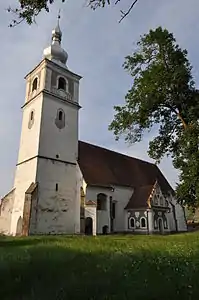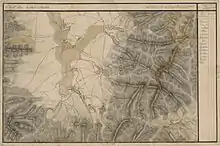Cozmeni
Cozmeni (Hungarian: Csíkkozmás, Hungarian pronunciation:[ˈtʃiːkkozmaːʃ]) is a commune in Harghita County, Romania. It lies in the Székely Land, an ethno-cultural region in eastern Transylvania, and is composed of two villages:
- Cozmeni / Csíkkozmás
- Lăzărești / Lázárfalva
Cozmeni
Csíkkozmás | |
|---|---|
 Catholic church in Cozmeni | |
 Location in Harghita County | |
 Cozmeni Location in Romania | |
| Coordinates: 46°13′37″N 25°56′26″E | |
| Country | |
| County | Harghita |
| Government | |
| • Mayor | László Szántó (UDMR) |
| Area | 70.5 km2 (27.2 sq mi) |
| Population (2011)[1] | 2,115 |
| • Density | 30/km2 (78/sq mi) |
| Time zone | EET/EEST (UTC+2/+3) |
| Postal code | 537065 |
| Area code | +40 266 |
| Vehicle reg. | HR |
| Website | cozmeni |
Location
The commune is located in the Ciuc Depression, at the southern edge of Harghita County, on the border with Covasna County. It neighbors the following communes: to the east Plăieșii de Jos, to the west Tușnad, to the north Sânmartin, and to the south Malnaș and Turia. The county capital, Miercurea Ciuc, is 21 kilometres (13 mi) to the north on route E578. The Olt River flows from north to south at less than 5 kilometres (3.1 mi) to the west of Cozmeni, while Lake Sfânta Ana (the only volcanic crater lake in Romania) is about 16 kilometres (9.9 mi) to the south-west.
History
The villages belonged to the Csíkszék district until the administrative reform of Transylvania in 1876, when they fell within Udvarhely County in the Kingdom of Hungary. In the immediate aftermath of World War I, during the Hungarian–Romanian War (1918–1919), the area passed under Romanian administration. By the terms of the Treaty of Trianon of 1920, it became part of the Kingdom of Romania, and the villages fell within Ciuc County during the interwar period.
As a result of the Second Vienna Award of August 1940, the region became part of Hungary until the Romanian Army and the Red Army entered the area in September–October 1944. After Soviet occupation, the Romanian administration returned in March 1945, and the commune became again officially part of Romania in 1947. Between 1952 and 1960, the commune fell within the Hungarian Autonomous Province, and between 1960 and 1968 within the Mureș-Hungarian Autonomous Province. In 1968, the province was abolished, and since then, the commune has been part of Harghita County. Formerly part of Sânmartin (Csíkszentmárton) commune, the two villages broke off in 2004.
Demographics
The commune has an absolute Székely (Hungarian) majority. According to the 2011 census it has a population of 2,089 of which 96.07% or 2,007 are Hungarian.

References
- "Populaţia stabilă pe judeţe, municipii, oraşe şi localităti componenete la RPL_2011" (in Romanian). National Institute of Statistics. Retrieved 4 February 2014.



